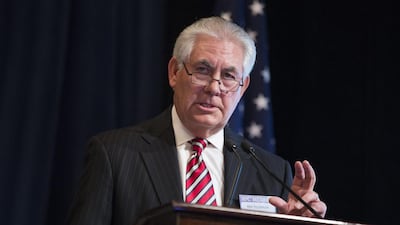“Don’t talk to me about barrels of oil. They might as well be bottles of Coca-Cola. I don’t understand.” So said former US secretary of state Henry Kissinger. The new nominee, Rex Tillerson, understands oil, if anything, too well.
Petroleum gives Mr Tillerson much common ground with leaders in the Middle East. He became chairman and chief executive of ExxonMobil in 2006, succeeding long-time boss Lee Raymond. In the Exxon tradition, both men started out as engineers.
Mr Tillerson became president of Exxon’s Yemen subsidiary in 1995. The company has built up a strong Middle East position, particularly its world-leading liquefied natural gas business in Qatar. It renewed its offshore Zadco concession in Abu Dhabi on favourable terms in 2014 but decided to sit out the renewal of Adco onshore, where it has previously held a stake. ExxonMobil is also developing the giant West Qurna 1 field in southern Iraq, exploring in the Kurdistan region and has a refining joint venture in Saudi Arabia.
Despite, or because of, his position at the helm of a US$367 billion company, Mr Tillerson faces a rocky road to confirmation as secretary of state. Criticism of his appointment has focused on two issues – plutocracy and Russia.
The first objection seems misplaced. In a cabinet bulging with billionaires, his net worth of $150 million is modest. Despite descriptions of him as an “oil tycoon”, he has simply been a company employee, whose $27m salary last year is by American standards not extravagant. He did not build Exxon, which emerged from John D Rockefeller’s Standard Oil in 1911, nor even ExxonMobil, formed by the 1999 merger steered by Mr Raymond.
Divesting his ExxonMobil stock and options to avoid conflicts of interest may be complicated but far less opaque and intricate than unwinding his new boss’s business interests.
In the wake of revelations about Russian hacking and election manipulation, Mr Tillerson’s close ties to president Vladimir Putin and Rosneft’s chief executive, Igor Sechin, raise red flags for Democrats and some Republicans. Donald Trump’s instincts do seem to be to deal with Russia, and probably to lift sanctions imposed on its energy industry. But it seems unlikely that Mr Tillerson has any illusions about his counterparts, or that he would seek to undo sanctions just to benefit his former employer.
The more valid criticisms hinge on Mr Tillerson’s business record and diplomatic experience. Despite his wide travels, he has never lived for long outside the US, something inconceivable for a top executive of Shell or BP. This time, he will not be the chief, but the servant of an erratic boss, with a scattergun selection of colleagues.
His chief executive tenure involved a number of missteps. ExxonMobil entered Iraq in 2010 on very tough terms (similarly to nearly all the other oil companies that ventured there). In 2011, however, in defiance of a Baghdad blacklist, the company signed for six exploration licences with the autonomous Kurdish region, infuriating the central government and the US state department. ExxonMobil eventually had to reduce its stake in West Qurna 1. And after making little headway, it relinquished three of its Kurdish blocks this month.
Like the other big oil companies, ExxonMobil was slow to recognise the potential of US shale. Attempting to gatecrash the boom, Mr Tillerson bought XTO Energy in 2010 for $41bn, just as natural the price of gas plunged; it has not recovered since.
Attempts to analyse Mr Tillerson’s probable approach in office in terms of the oil industry’s interests are misguided. It is more likely that his tenure will follow the ExxonMobil mindset – hierarchical, centralised, fact-driven, unemotional, uncompromising and ruthlessly focused on the bottom line. Running a major oil company requires more than understanding barrels. But does it give the subtlety for a multidimensional world, where sometimes the only deals on offer are flawed?
Robin Mills is the chief executive of Qamar Energy and the author of The Myth of the Oil Crisis
business@thenational.ae
Follow The National's Business section on Twitter


